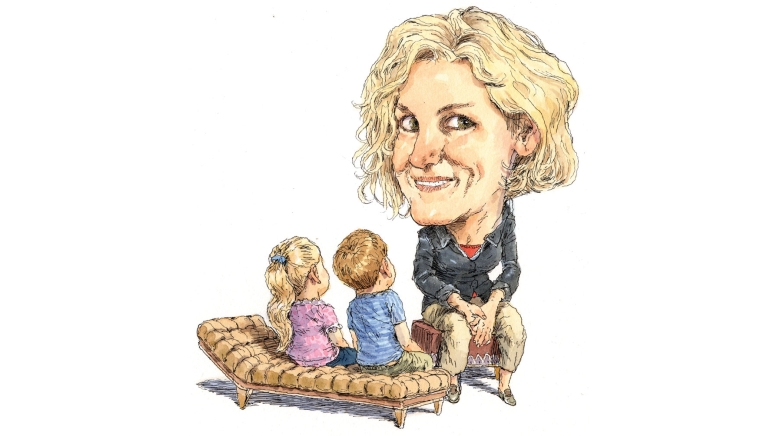Notable: Known as “The Shame-less Psychiatrist” with a focus on raising children to be comfortable with their sexuality; board member of American Psychiatric Association; contributor to Psychology Today blog; author of Shame-Less: Talking to Your Kids About Sexuality, Self-Confidence, and Healthy Relationships (2020)
Career: Established private practice in 2009; assistant clinical professor and former fellow, New York University School of Medicine; residency at St. Vincent’s Hospital, New York City
Education: A.B., psychology; M.D., New York Medical College, 2003
Personal: Lives with husband Alexander and two young daughters in Southampton, New York
“I knew I wanted to be in the mental health field at the age of 14 or 15, when I started working at a psychiatric hospital. My aunt, a social worker, took me, wide-eyed, into the psych wards. She later said I was too young, but it shaped my life.”
“At Dartmouth I studied biological psychology with Michael Gazzaniga ’61—a great mentor. The scandal in the psychological and brain sciences department wasn’t my experience. Mine was one of absolute wonder and doing amazing research.”
“A lot of children are growing up in homes where parents are dating. Introduction of your new dating partner into your child’s life should be done on neutral territory. The child should be given ownership over the process rather than told how to handle it. The other parent has to accept the new person as a parental figure and try to see the positives.”
“It’s conflict that damages children, not a stepparent taking them to McDonald’s, not different rules at different houses.”
“I tell parents, ‘Don’t pass down intergenerational trauma. Pass down intergenerational wisdom.’ If you were hurt, abused, injured in any way, you don’t need to pass down scary messages. Instead, pass down what your children can do to protect themselves. What do you wish you had known? Pass that down.”
“When it comes to discussing coronavirus, correct any misinformation your kids may have. They will worry most about themselves and their family. Reassure them that social-distancing measures are keeping families safe and that most people who get the virus will recover.”
“Parents should constantly monitor their kids’ phones, their social media, their internet use. Early exposure to pornography is a huge problem now. It causes a lot of damage for both girls and boys in terms of self-esteem and sexual aggression.”
“When you rescue your kids from challenging situations, you create more anxiety in the long run. If they’re at summer camp, crying they want to come home, you say, ‘I’ll send you a care package of all your favorite things, but you’ve got to stick it out. You’re committed to this.’ ”
“Sex education should be early and ongoing, starting with teaching your child the correct names of body parts and showing where those parts are as soon as your child starts to talk. Then you teach the basics of biology and hygiene. Next you explain boundaries and consent. Studies show that children who can name their body parts correctly are less likely to be sexually abused, more likely to report abuse, and more likely to be believed if they do.”
“If you wait to have a ‘sex talk’ with kids entering puberty, it’s too late.”
“Both parents should be involved in the sex education of their children. Mothers, perhaps even more than fathers, can be sure their sons understand consent, that every step requires new consent.”




